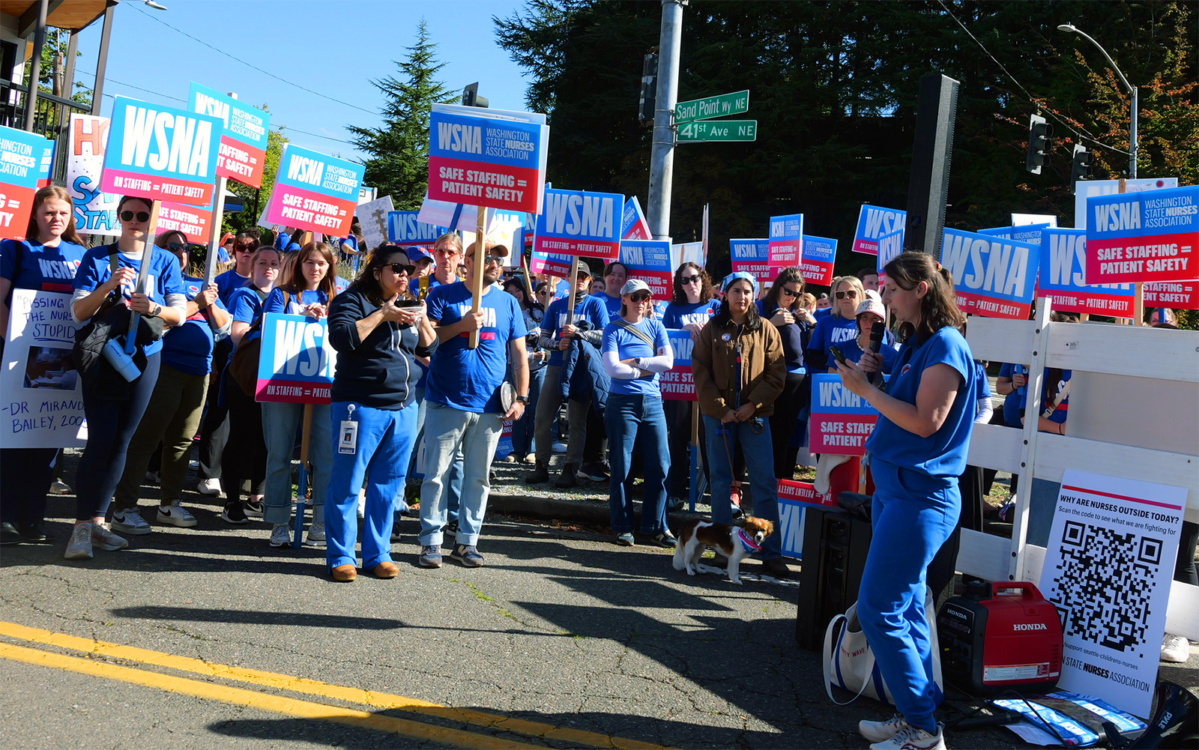
Community support grows for Seattle Children’s nurses in contract fight

Seattle Children’s nurses involved in a massive contract fight received public support from Washington State legislators, local labor partners, and Dr. Benjamin Danielson, the former medical director of Seattle Children’s Hospital’s Odessa Brown Children’s Clinic.
Danielson wrote a public letter of support to nurses Oct. 14.
“I have been especially guided by your moral grounding, which is deeply woven into your dedication to helping others. In particular, your stalwart championing of DEI and antiracism has stood as healthcare’s beacon. In this, and so many other ways, you are the conscience of caring,” he said in his letter. “I stand with you in your efforts to keep anti-racism and DEI at the center of your work and at the top of the contract with Seattle Children’s Hospital.
The hospital has proposed removing reference to its Health Equity and Anti-Racism Initiatives and to strike language that “racism is a public health crisis, that racism has no place within Seattle Children’s Hospital, and that racism affects the health of employees, patients, and patients’ families.”
The hospital has also scrubbed references to its DEI and anti-racism work from its website.
Danielson said he is “appalled but not surprised” by the hospital’s “quick abandonment of DEI and anti-racism.”
“This may well be one of the most important times in our history for our values around DEI and anti-racism to be assertively expressed. Values like these are most meaningful when they are challenged,” he wrote.
The hospital has also proposed that nurses’ employment claims be handled through mandatory arbitration instead of the courts where nurses have access to jury trials and the right to appeal.
As Danielson said in his letter: “Seattle Children’s Hospital is trying to take away your voices as nursing professionals.”
Eight area state legislators, meanwhile, signed a letter to Seattle Children’s CEO Jeff Sperring asking the hospital to come to the table with “responsive good-faith proposals.”
WSNA has proposed a host of health and safety improvements, including resources to protect nurses from workplace violence in high-risk areas, increased sick leave to avoid adverse patient health outcomes, and break relief that would allow nurses work-free time to rest, eat, and hydrate. Seattle Children’s has rejected each of these proposals, while asking for language that would limit nurses’ collective power.
“As legislators we understand that compromise is necessary in negotiations. However, we have a hard time understanding why the number one most profitable and wealthiest major health system in Washington with profit margins of 14% (FY24) and 13% (FY25 through Q3), is coming to the table with proposals that limit safety measures and worker rights.”
The Martin Luther King, Jr. County Labor Council, which represents more than 150 unions and more than 220,000 workers, also issued a resolution demanding Seattle Children’s Hospital restore its stated values of being an equitable antiracist institution and stop its attack on workers and their union.
Nurses are guided by the principle that all people deserve optimal health. These values are embedded in the American Nurses Association’s 2025 Code of Ethics.
“Nurses and their professional organizations work to enact and resource practices, policies and legislation to promote social justice, eliminate health inequities, and facilitate human flourishing,” according to the Code of Ethics.
Danielson worked at Seattle Children’s for 20 years before resigning in 2020 over charges of racism, and in December 2024, a jury awarded him $21 million in a discrimination lawsuit.
Danielson said he remembers a time at Seattle Children's Hospital when union nurses and management used to work well together.
“And yet I watch today as the hospital rejects important values around DEI and anti-racism and aggressively tries to undermine your union. I urge you to stand strong. I know from personal experience that even powerful institutions like this can be overcome; if you stick to your values and you stand, arms locked, together.”
WSNA appreciates the broad community support it and the nurses it represents are receiving. The parties have recently engaged a federal mediator, and the union is hopeful that mediation will be productive in helping the parties achieve mutual agreement on the range of outstanding issues, including economics, health and safety, health equity, and anti-racism.
